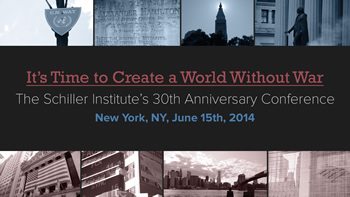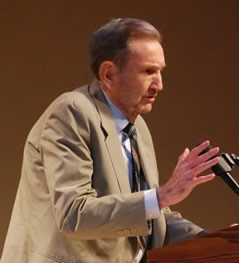 |
The Schiller Institute's
|
Ramsey Clark
We Want To See A Peace on Earth
(AUDIO, VIDEO)
Ramsey Clark is the former U.S. Attorney General under President Lyndon Johnson, and a lifelong fighter for the preservation of our Constitutional republic.
...I’m going to speak very briefly. It’s an important occasion and an important moment. The last thing I heard on the news is that one of our aircraft carriers is steaming toward the [Persian] Gulf and the Arabian Sea to strike once again at Iraq—one of our favorite punching bags over the last four or five decades. A place that’s been called the birthplace of civilization, that’s suffered more violence over a longer period of time—at least since 1963, ’73, ’83; take your choice—than any other country. It’s now largely in ruins, and we’ll add a few more.
Coming up here in a taxi, because I knew I wouldn’t have much time, I tried to think of our military aggressions since Vietnam, but before I get into those, I’ll do the happy note.

Ramsey Clark. |
I visited both Korea and Vietnam twice last year. It was a decennial anniversary of those two wars: ’53 for Korea, and ’73 for Vietnam. And it’s about the only optimistic thing I know of on the planet today, because Vietnam particularly is thriving. And the people are happy, the streets are crowded. It may be five on a motorbike, but they love it, and they’ve got plenty of food and they’ve got no violence.
The hospitals still have infants cruelly twisted—their bodies and limbs—from Agent Orange, and we don’t know how long. The smart guys who figured out Agent Orange didn’t figure out how long it will be before you can purge it from a system where it’s become widespread so that it doesn’t destroy your children. But you can overcome and you can go forward, and two victims of our violence are powerful evidence to that fact on Earth today.
The wars in Korea and Vietnam were singularly devastating in the worst sense. World War II. But there have been so many others since. Coming up in the cab, I started trying to list some of them. And after Vietnam, we had Nicaragua—it was a proxy war in some degree, but it was devastating for Nicaragua. It undermined their economy, it killed a lot of their people, destroyed a lot of their infrastructure. And we didn’t destroy territory with Agent Orange as we did in Asia, but Nicaragua is free and independent, but it’s poor.
Back to the Stone Age
Iraq and Libya are both more devastated than any other time in this century, and the past two for that matter. Both were prosperous countries; in their areas, they were the most prosperous. They had good medical systems, good housing, good schools; and both lie in ruins. Libya is a little harder for us to imagine than Iraq, because you hear more about Iraq, but Libya hadn’t known violence since the end of the desert campaign in late 1942, although they were still picking up landmines from the beaches from World War II. And there are probably still some there; that’s the way we do it. But the standard of living was high, the level of education was high and strong, and they were both bombed back into the Stone Age, as some of our generals like to say. Boy, I remember that phrase, we’ll bomb you back into the Stone Age. Happy New Year.
Grenada is an excellent example. A peaceful little vacation island—a lovely, lovely island. It had no war; no capacity for war, really, and didn’t have 110,000 people. And we invaded one day; scared a bunch of the American kids who were students at a medical school on the beach there. (I don’t know how much medicine they were learning with the beach so close.) And we killed more people in Grenada than we lost in World War II in proportion to the population, which is not a lot of people. I’ll tell you this, there was nobody on Grenada who didn’t know someone who got killed in that little incursion....
Countries like Rwanda and Panama. We used artillery from our permanent bases along the Canal there to rain fire in on the capital of Panama and hit the mayor’s office, and hit the major buildings, and left the beaches a mess, and dragged bodies down on the beaches and used flamethrowers to ashen them, and then wash them into the sea. You can’t tell how many people were killed.
There was a general out there—I got there about eight days after the invasion—and there was a general, major general, and he said 68 people had died. And I was walking down the street one day and a priest came up and he said, “Go to the cemetery; it’s called Jardin de Paz (Garden of Peace),” and I didn’t know where it was. And he said, “I drive around it every morning, and at the crack of dawn, these military trucks come in, and they’ve got canvas over them, you can’t see what’s in them, but something’s going on in there.” So, we drove over to the cemetery, and there were a bunch of kids that played in the front part of it, jumping over tombstones and like that. We said, “Have you seen trucks come in here?” And they said, “Oh yeah.” “Where are they going?” So, one of them got in the car with us, and drove us back to some woods. And there were three long trenches about 60 or 70 yards long, I paced them off, and about 3 paces—9 or 10 feet. Two of them were filled in completely, and one was half filled. And when they were exhumed, there were about 500 bodies out there. I don’t think the families knew anything about what happened to them, or who. There they were. Panama is a minor victim compared to other countries, if you think of what Afghanistan has been through.
Sudan was interesting. We decided we didn’t like Sudan for some reason. And one fine morning we launched—as if it were an athletic enterprise—we sent a couple of thousand-mile missiles to the largest-producing pharmaceutical plant in all of Africa, which is just outside the capital there. A modern plant, foreign-owned, obviously. And whammy! It was dust. And it was exporting, free of charge, 20% of its product to countries in sub-Saharan Africa. It was the main source of the most sophisticated pharmaceuticals that were available there. Why we chose that as a target you can only imagine, but I’ll tell you this: It’s the type of target people remember when they know about it. And the people in Khartoum sure know about it.
‘No More, No More’
Anyway, the numbers of wars have been so great and so deadly, and we’ve so glorified the power of violence; we’ve spent so much of our ingenuity on more sophisticated ways of killing people on the cheap at the minimum risk to ourselves. And it’s been, how many years since 1967, when Dr. Martin Luther King at the Riverside Church here, said “The greatest purveyor of violence on Earth was my own government.” And that violence is the ultimate human degradation. Other animals don’t kill themselves in masses like that, you know? It’s hard enough for them to get enough food, without worrying about going off and just randomly slaughtering their own species. But we spend a lot of money and a lot of ingenuity at it. And certainly as much as it was true in 1967, we’re the greatest purveyor of violence on Earth.
I think I said the last thing I heard on the radio this morning was an aircraft carrier steaming toward the Gulf, ready to add a few more licks on the Cradle of Civilization, which hasn’t known a moment of peace since our invasion in January of 1991, really. Remember, we had 115,000 aerial sorties over [Iraq] in four months; you could figure out how many that was every minute or something like that. It was a stunning number. I was there during the bombing, and the planes, American planes, were over all the time. I remember one time we were on top of this hotel having dinner in the dark, because the electricity was out, and there were some bombs that hit close by, so we ran up. And we were on the Shatt al-Arab, where the Tigris and Euphrates come together and flow down to the Gulf, and Iran is just across the Shatt. And there’s a—I don’t know why they put it there—there’s a hospital, a good training hospital—a major hospital; I’ve been in it before—on a little island. There’s two bridges that go out to it, about 20 or 30 feet. And there’s no electricity in the country, but there is certainly not any in Basra, but there were emergency lights. There were lights on in the emergency rooms where they had electric generators going, and we saw bombs going down the Shatt, just hitting the island, and then the lights went out in the hospital down there. It was no possible military threat to the United States in that area, certainly not in that hospital or in the hotel we were having supper in. We were the only guests there. The chef was so happy, he made rolls for us and stuff, and cooking in the dark, or a lot of Coleman lanterns or something. And here’s Iraq, all these years later, and now facing perhaps the heaviest violence it’s had so far. And our—as we’ve called it for a long time—military-industrial complex being the greatest threat to life on the planet. And we live here. We have voices; we have hearts; we have minds; we have energy. And we have to rise up and say, “No more. No more.” We want our country to end violence in the world, not to be the greatest purveyor of violence on Earth. We want to end our military preparations and manufacturing. We want to see, before it’s too late, a peace on Earth in which our precious little children can live healthy lives and grow up with healthy minds and bodies to live in peace and love each other....
Thank you very much.
